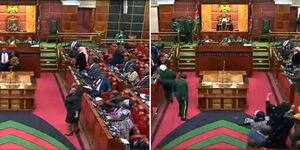A court decision, delivered this week by Justice Byrum Ongaya, determined that the Teachers Service Commission (TSC) acted outside its legal mandate by hiring interns as teachers, dealing a significant blow to the educational sector, which is set to implement the JSS phase in just two weeks.
The landmark ruling for interns by the Employment and Labour Relations Court (ELRC) has thrown the future of Junior Secondary Schools (JSS) into uncertainty, questioning the legality of employing intern teachers who are central to the new Competency-Based Curriculum (CBC).
The ruling suggests that nearly 60,000 teachers, initially hired as interns, could now be eligible for full salaries retrospectively for the duration of their service, as their rights to fair labour practice were deemed to have been violated by the TSC.
Justice Ongaya’s decision highlighted that employment should not be disguised to circumvent legal and constitutional safeguards.
"Employment is a fact established by evidence," Justice Ongaya noted, "and disguising employment as an internship to escape the effect of employment laws cannot pass the chains of social justice in employment or work relationships."
The immediate implications of the ruling are profound, casting doubt on the preparedness of schools to open for the new term with sufficient teaching staff. The TSC had been using the internship programme to address chronic teacher shortages and to quickly scale up the workforce for the JSS under the new CBC.
Introduced to mitigate a longstanding teacher deficit, the intern programme has been a cornerstone of the government's strategy under President William Ruto’s administration. However, it has faced criticism and legal challenges, particularly concerning the extension of intern terms and the conditions of employment.
In December, President Ruto extended the internship period by another year, delaying the potential for permanent and pensionable positions for thousands of teachers, a move that sparked further discontent among educational professionals and stakeholders.
During court proceedings, it was revealed that although contracted to teach only two subjects, interns were, in practice, teaching a full curriculum including sciences and mathematics, which further complicates their employment status as "interns."
Moreover, it emerged that despite receiving only an intern stipend, full taxes and government contributions, including the controversial housing levy, were deducted from their payments.
The ruling also criticizes the handling of the educational quality and rights of children, with the court expressing concerns about the government using students as "test guinea pigs" to trial the new CBC system.
The case, brought forward by the Forum for Good Governance and Human Rights, argued that the TSC and other respondents, including the Cabinet Secretary for the Ministry of Education and the Attorney General, failed to provide a lawful framework for the employment of interns.
Looking ahead, TSC Secretary General and CEO Nancy Macharia had announced plans in February to hire an additional 20,000 interns by July, a strategy now jeopardized by the court’s decision.
The Ministry of Education and TSC are yet to provide a way forward two weeks before schools reopen for a second term.












